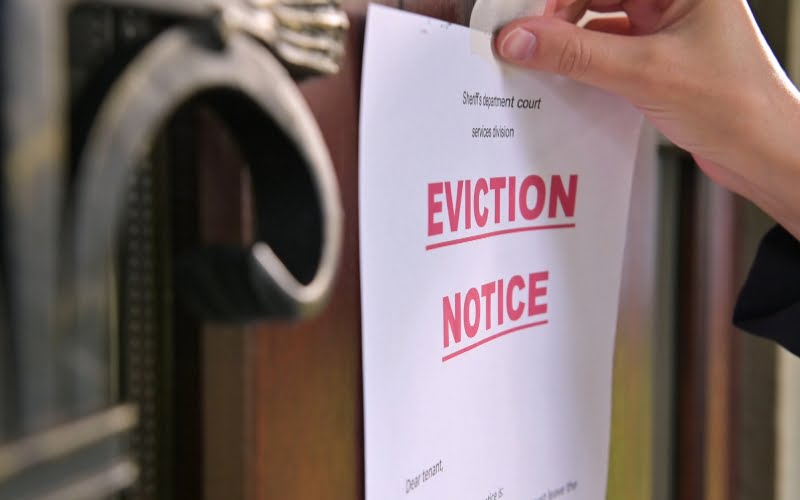Last Updated on March 18, 2024 by Kelvin Nielsen
Are you a renter in Connecticut and facing an eviction? If so, you have certain rights under the state’s landlord-tenant laws.
The landlord must carry out the summary eviction process in strict adherence to the laws. The penalties for unlawful eviction can be quite significant. They can include both civil and criminal.
The following is a guide regarding Connecticut tenants’ rights during eviction.
Connecticut Tenants’ Rights In An Eviction
Connecticut is a fairly tenant-friendly state. Tenants enjoy a myriad of protections under federal, state, and local laws. When it comes to evictions, the following are the rights you enjoy.
#1: You have a right to proper notification.
Your landlord cannot just evict you however they want. They must follow the due process outlined under the law. The first process requires that the landlord terminate the tenancy by serving the tenant an eviction notice.
The type of eviction notice to serve will depend on the reason for eviction. For instance, if the landlord is terminating your month-to-month lease, they must serve you a 30-Days’ Notice to Quit. This will give you 30 days to move out of the unit. If you don’t, the landlord may decide to move to court to file a lawsuit.
#2: You have a right to fight the eviction.
You have a right to file an answer with the court once you receive a copy of the Summons and Complaint after the landlord files a lawsuit with the court.
In the answer, you can fight the eviction by providing legal defenses such as:
- The eviction notice was inappropriate.
- The landlord tried to evict you illegally. For example, by throwing out your personal belongings or locking you out of the property.
- The eviction was retaliatory after exercising your legal right, such as reporting the landlord to a local government agency for failing to make repairs.
- The eviction was based on the tenant’s race, color, religion, nationality, or any other protected class.
#3: The right to continue living on the property until the landlord has followed the due process to evict you.
Even after you have lost your fight against the eviction, you’d still have a right to continue living on the property until the court order is out.
And even after the court order has been issued against you, you’d still be able to request a stay of execution. The stay of execution can help you continue living on the property for up to 6 months more.
#4: The right to have your personal property protected from damage.
Even after the landlord wins the eviction case, they cannot throw out or dispose of your belongings. They must handle the property in a humane way. In fact, they must still allow you time to move the belongings from the property.
Frequently Asked Questions (FAQs): Connecticut Tenants’ Rights During Eviction
Q: How long does it take to evict a tenant in Connecticut?
A: A summary eviction process in Connecticut can take anywhere between four and seven weeks. The exact timeframe will depend on a number of factors, including the reason for the eviction, or whether or not the tenant fights it.
Q: How much does a landlord have to give a tenant to move out in CT?
A: This will depend on the reason for the eviction. The following table summarizes the notice period needed to evict a tenant based on the violation committed.
| Notice Period | Reason for Eviction |
| 3 days | Failure to pay rent |
| 30 days | End of lease/no lease |
| Lease violation | 15 days |
| Illegal activity | 3 days |
Q: Can a landlord evict you without a court order in Connecticut?
A: No! A landlord must have a court order to carry out a summary eviction process in Connecticut. And in order for the court to issue a court order, the landlord must undergo a series of procedures. Including, serving proper notice, filing a lawsuit in court, attending court hearing, and obtaining a court order.
Q: How do I fight an eviction in Connecticut?
A: You can fight an eviction in Connecticut in multiple ways. The most common defenses include:
- The landlord served you an improper notice.
- The landlord failed to maintain the unit to a habitable standard.
- The landlord is retaliating against you after you reported them for health or safety issues to a local government agency.
- The eviction notice had errors. For instance, it failed to mention the effective date of lease termination.
- The eviction was borne out of discrimination due to your race, color, religion, sex, ancestry, or any other protected class.
Q: How long does an eviction stay on your record in CT?
A: In Connecticut, an eviction, especially due to unpaid rent or utility bills, can stay on your record for up to 7 years.
Conclusion
Connecticut tenants have certain rights during an eviction. Familiarizing yourself with your rights can help protect you from exploitation or abuse by your landlord. If you have a specific question, please leave a comment below for expert advice.
Disclosure: The content herein isn’t a substitute for advice from a professional attorney. It’s only meant to serve educational purposes. If you have a specific question, kindly seek expert attorney services.
Sources: Connecticut General Statutes Title 47A, Connecticut Judicial Branch, Tenants’ Rights in Connecticut,

Hi, I’m Kelvin Nielsen, an experienced landlord and accomplished real estate lawyer. My focus is on answering your questions about renting in the hopes of making your life as a renter or a landlord a bit easier.







